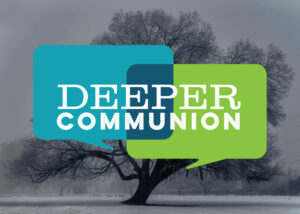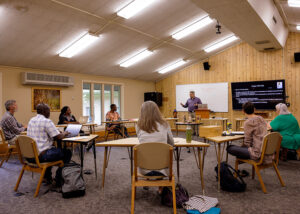The last time my in-laws came north to visit, they brought us a broken electric kettle. We had gifted it to them at a long-ago Christmas. Now, years later, it stopped working. It was under warranty, but that only applied in Canada. With repair, it could function and stay out of the landfill.
That is why a broken kettle has been on my kitchen counter for more than two months. Every time that I look at it taking up space, and despair about when I’m going to deal with it, I remember that simple living and good stewardship of resources are foundational parts of my Mennonite faith heritage, one that I hold dear even when inconvenient.
In the face of the climate emergency, all of us need to make choices that are inconvenient as we commit to following Jesus with costly discipleship. In true relationship with God, we are transformed by God’s grace and love in our lives, and cannot help but share that love with the world.
In Matthew 6:25-30, Jesus talks about God’s care for the birds of the air, the lilies of the field, and for us, God’s children. Part of sharing God’s love is making choices that put the well-being of the planet and vulnerable people above our own desires for comfort and ease. We do this privately and publicly, taking action and witnessing to God’s love for all of creation.
I see our nationwide Mennonite Church Canada community as a living social ecosystem with actors playing different roles. In my role as a decision-maker within MC Canada, the question on my mind is how to invest in and cultivate mutually reinforcing functions and roles in the ecosystem as we respond faithfully to the climate crisis:
- Can we call on our Mennonite academics and theologians to provide biblically grounded resources to deepen our faith and guide our climate action?
- How might church finance and property committees take on environmental stewardship responsibilities?
- Will church voting delegates commit to joyfully approving annual budgets that include carbon offset funds for travel?
- What part do our camps, ministries and denominational partners, including Christian Peacemaker Teams and Mennonite Central Committee, have to play?
- When should regional or nationwide churches speak publicly on behalf of our faith community, and when do congregations or working groups take the lead?
We all can, and need to, do more to address the climate crisis. The church is all of us together following Jesus, including the intertwining of worship and witness that comes from taking faithful action together. My prayer is that, as the people of MC Canada, we can build a faith-driven movement that inspires meaningful climate action. We need to embrace this as personal discipleship practice and as a public witness of love to the world, as we live into God’s shalom for all of creation. From repairing broken kettles to marching for climate justice, may we open ourselves to God’s transforming love for all of creation.
Leah Reesor-Keller is the executive minister of MC Eastern Canada and a member of the Executive Staff Group of MC Canada.
Read more From Our Leaders columns:
We are a global family of faith every day
No limits
The banality of saying ‘Intercultural’
Holy space
Take a breath before the plunge








Leave a Reply
You must be logged in to post a comment.